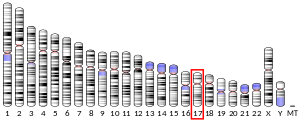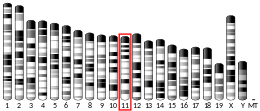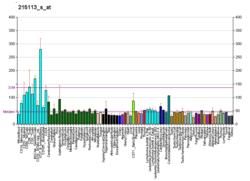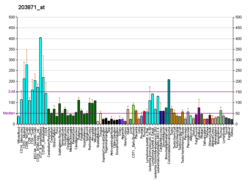SENP3
SUMO1/sentrin/SMT3 specific peptidase 3, also known as SENP3, is a protein which in humans is encoded by the SENP3 gene.[5][6]
| SENP3 | |||||||||||||||||||||||||
|---|---|---|---|---|---|---|---|---|---|---|---|---|---|---|---|---|---|---|---|---|---|---|---|---|---|
| Identifiers | |||||||||||||||||||||||||
| Aliases | SENP3, SMT3IP1, SSP3, Ulp1, SUMO1/sentrin/SMT3 specific peptidase 3, SUMO specific peptidase 3 | ||||||||||||||||||||||||
| External IDs | OMIM: 612844 MGI: 2158736 HomoloGene: 9236 GeneCards: SENP3 | ||||||||||||||||||||||||
| |||||||||||||||||||||||||
| |||||||||||||||||||||||||
| |||||||||||||||||||||||||
| |||||||||||||||||||||||||
| Orthologs | |||||||||||||||||||||||||
| Species | Human | Mouse | |||||||||||||||||||||||
| Entrez | |||||||||||||||||||||||||
| Ensembl | |||||||||||||||||||||||||
| UniProt | |||||||||||||||||||||||||
| RefSeq (mRNA) | |||||||||||||||||||||||||
| RefSeq (protein) | |||||||||||||||||||||||||
| Location (UCSC) | Chr 17: 7.56 – 7.57 Mb | Chr 11: 69.67 – 69.68 Mb | |||||||||||||||||||||||
| PubMed search | [3] | [4] | |||||||||||||||||||||||
| Wikidata | |||||||||||||||||||||||||
| |||||||||||||||||||||||||
SENP3 together with SENP5, belongs to the Ulp1 branch in yeast and localize to nucleolus through B23/NPM1. SENP3 is associated and regulated by B23/nucleophosmin/NPM1 and involved in the regulation of ribosome biogenesis. SENP3 may be regulated by Arf-Mdm2-p53 pathway.[7]
Further reading
- Yeh ET, Gong L, Kamitani T (2000). "Ubiquitin-like proteins: new wines in new bottles". Gene. 248 (1–2): 1–14. doi:10.1016/S0378-1119(00)00139-6. PMID 10806345.
- Nishida T, Tanaka H, Yasuda H (2000). "A novel mammalian Smt3-specific isopeptidase 1 (SMT3IP1) localized in the nucleolus at interphase". Eur. J. Biochem. 267 (21): 6423–7. doi:10.1046/j.1432-1327.2000.01729.x. PMID 11029585.
- Hartley JL, Temple GF, Brasch MA (2001). "DNA cloning using in vitro site-specific recombination". Genome Res. 10 (11): 1788–95. doi:10.1101/gr.143000. PMC 310948. PMID 11076863.
- Wiemann S, Weil B, Wellenreuther R, et al. (2001). "Toward a catalog of human genes and proteins: sequencing and analysis of 500 novel complete protein coding human cDNAs". Genome Res. 11 (3): 422–35. doi:10.1101/gr.GR1547R. PMC 311072. PMID 11230166.
- Simpson JC, Wellenreuther R, Poustka A, et al. (2001). "Systematic subcellular localization of novel proteins identified by large-scale cDNA sequencing". EMBO Rep. 1 (3): 287–92. doi:10.1093/embo-reports/kvd058. PMC 1083732. PMID 11256614.
- Strausberg RL, Feingold EA, Grouse LH, et al. (2003). "Generation and initial analysis of more than 15,000 full-length human and mouse cDNA sequences". Proc. Natl. Acad. Sci. U.S.A. 99 (26): 16899–903. doi:10.1073/pnas.242603899. PMC 139241. PMID 12477932.
- Ota T, Suzuki Y, Nishikawa T, et al. (2004). "Complete sequencing and characterization of 21,243 full-length human cDNAs". Nat. Genet. 36 (1): 40–5. doi:10.1038/ng1285. PMID 14702039.
- Colland F, Jacq X, Trouplin V, et al. (2004). "Functional proteomics mapping of a human signaling pathway". Genome Res. 14 (7): 1324–32. doi:10.1101/gr.2334104. PMC 442148. PMID 15231748.
- Gerhard DS, Wagner L, Feingold EA, et al. (2004). "The status, quality, and expansion of the NIH full-length cDNA project: the Mammalian Gene Collection (MGC)". Genome Res. 14 (10B): 2121–7. doi:10.1101/gr.2596504. PMC 528928. PMID 15489334.
- Wiemann S, Arlt D, Huber W, et al. (2004). "From ORFeome to biology: a functional genomics pipeline". Genome Res. 14 (10B): 2136–44. doi:10.1101/gr.2576704. PMC 528930. PMID 15489336.
- Bouras T, Fu M, Sauve AA, et al. (2005). "SIRT1 deacetylation and repression of p300 involves lysine residues 1020/1024 within the cell cycle regulatory domain 1". J. Biol. Chem. 280 (11): 10264–76. doi:10.1074/jbc.M408748200. PMID 15632193.
- Andersen JS, Lam YW, Leung AK, et al. (2005). "Nucleolar proteome dynamics". Nature. 433 (7021): 77–83. doi:10.1038/nature03207. PMID 15635413.
- Grégoire S, Yang XJ (2005). "Association with class IIa histone deacetylases upregulates the sumoylation of MEF2 transcription factors". Mol. Cell. Biol. 25 (6): 2273–87. doi:10.1128/MCB.25.6.2273-2287.2005. PMC 1061617. PMID 15743823.
- Mehrle A, Rosenfelder H, Schupp I, et al. (2006). "The LIFEdb database in 2006". Nucleic Acids Res. 34 (Database issue): D415–8. doi:10.1093/nar/gkj139. PMC 1347501. PMID 16381901.
- Nousiainen M, Silljé HH, Sauer G, et al. (2006). "Phosphoproteome analysis of the human mitotic spindle". Proc. Natl. Acad. Sci. U.S.A. 103 (14): 5391–6. doi:10.1073/pnas.0507066103. PMC 1459365. PMID 16565220.
- Gong L, Yeh ET (2006). "Characterization of a family of nucleolar SUMO-specific proteases with preference for SUMO-2 or SUMO-3". J. Biol. Chem. 281 (23): 15869–77. doi:10.1074/jbc.M511658200. PMID 16608850.
- Olsen JV, Blagoev B, Gnad F, et al. (2006). "Global, in vivo, and site-specific phosphorylation dynamics in signaling networks". Cell. 127 (3): 635–48. doi:10.1016/j.cell.2006.09.026. PMID 17081983.
- Yun C, Wang Y, Mukhopadhyay D, et al. (2008). "Nucleolar protein B23/nucleophosmin regulates the vertebrate SUMO pathway through SENP3 and SENP5 proteases". J. Cell Biol. 183 (4): 589–95. doi:10.1083/jcb.200807185. PMC 2582899. PMID 19015314.
- Haindl M, Harasim T, Eick D, Muller S (March 2008). "The nucleolar SUMO-specific protease SENP3 reverses SUMO modification of nucleophosmin and is required for rRNA processing". EMBO Rep. 9 (3): 273–9. doi:10.1038/embor.2008.3. PMC 2267381. PMID 18259216.
- Kuo ML, den Besten W, Thomas MC, et al. (2008). "Arf-induced turnover of the nucleolar nucleophosmin-associated SUMO-2/3 protease Senp3". Cell Cycle. 7 (21): 3378–87. doi:10.4161/cc.7.21.6930. PMID 18948745.
gollark: I mean, you probably won't notice average non-whateverphobic staff... staffing.
gollark: confirmation bias™?
gollark: You can't "unsee" things, though.
gollark: Yes, exactly. People will suffer horribly if they're forced to see memes in the wrong place.
gollark: Think of all the poor general channel users.
References
- GRCh38: Ensembl release 89: ENSG00000161956 - Ensembl, May 2017
- GRCm38: Ensembl release 89: ENSMUSG00000005204 - Ensembl, May 2017
- "Human PubMed Reference:". National Center for Biotechnology Information, U.S. National Library of Medicine.
- "Mouse PubMed Reference:". National Center for Biotechnology Information, U.S. National Library of Medicine.
- Yeh ET, Gong L, Kamitani T (May 2000). "Ubiquitin-like proteins: new wines in new bottles". Gene. 248 (1–2): 1–14. doi:10.1016/S0378-1119(00)00139-6. PMID 10806345.
- Wiemann S, Weil B, Wellenreuther R, Gassenhuber J, Glassl S, Ansorge W, Böcher M, Blöcker H, Bauersachs S, Blum H, Lauber J, Düsterhöft A, Beyer A, Köhrer K, Strack N, Mewes HW, Ottenwälder B, Obermaier B, Tampe J, Heubner D, Wambutt R, Korn B, Klein M, Poustka A (March 2001). "Toward a catalog of human genes and proteins: sequencing and analysis of 500 novel complete protein coding human cDNAs". Genome Res. 11 (3): 422–35. doi:10.1101/gr.GR1547R. PMC 311072. PMID 11230166.
- "Entrez Gene: SENP3 SUMO1/sentrin/SMT3 specific peptidase 3".
This article is issued from Wikipedia. The text is licensed under Creative Commons - Attribution - Sharealike. Additional terms may apply for the media files.





